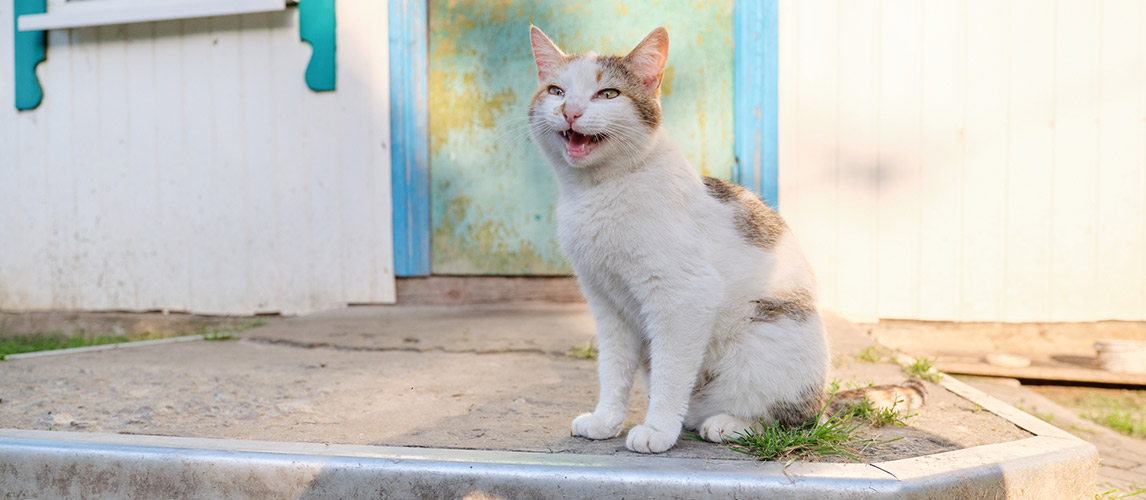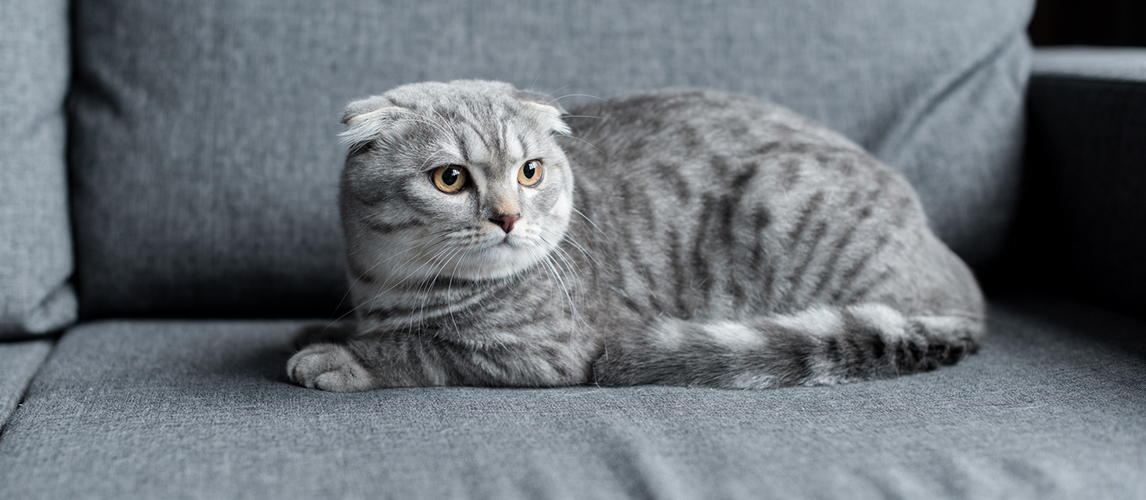A brain that deteriorates is not a sign of aging resigned only for humans. Sadly, cats can also develop feline senile dementia as they grow older, which can be tough on owners to see. When it first starts to manifest itself, owners can also be unsure of what is wrong with their cat other than the development of new, strange behavior. Cat dementia howling is a fairly common characteristic for example, but there are other considerations to take on board when fully understanding feline senile dementia.
Here, in this guide to Cat Dementia, we look at what exactly feline senile dementia is and what its symptoms are so that owners can have it treated as best possible, as soon as possible. We also look at what those treatments may be and how else we can help our feline friends while they grow old.
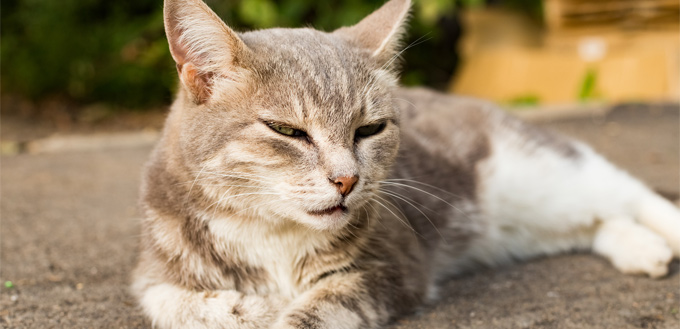
What Is Feline Senile Dementia?
So what exactly is feline senile dementia? Feline senile dementia is also known as CDS which stands for Cognitive Dysfunction System. While it affects more cats in old age, it can happen to any cat at any stage of their life. It affects a cat’s ability to learn and to remember as well as their awareness of their environment and how they respond to it. Sadly, it can also cause a certain level of anxiety in our feline friends too – hence, the cat dementia howling.
It is unknown what causes feline senile dementia, but it is thought that while age is an overriding factor, genetic factors also play a huge role in the development of the condition.
Do You Have A Senile Cat?
The first step to understanding feline senile dementia is to learn how to recognize whether you have a senile cat or not. As previously mentioned, cat dementia howling is common but what other ways can you spot whether you have a senile cat or not?
How To Spot Symptoms of Feline Senile Dementia
Spotting the first signs of feline senile dementia means that you have the best chance possible of getting your cat the best treatment from the moment the condition starts to make an appearance. Given that it affects the brain, mainly in an aging cat, simply being aware of the condition in the first place is a good start as there are no physical symptoms other than behavioral changes.
The behavioral changes to keep an eye out for are:
- Lack of self-grooming
- Fecal and urinary incontinence
- Changes in sleep cycle or lethargy
- Disorientation/confusion
- Anxiety/restlessness
- Extreme irritability
- Changes in activity levels, such as excessive licking
- Increased meowing (otherwise known as cat dementia howling)
- Avoiding social interaction
- Deterioration of learned behaviors
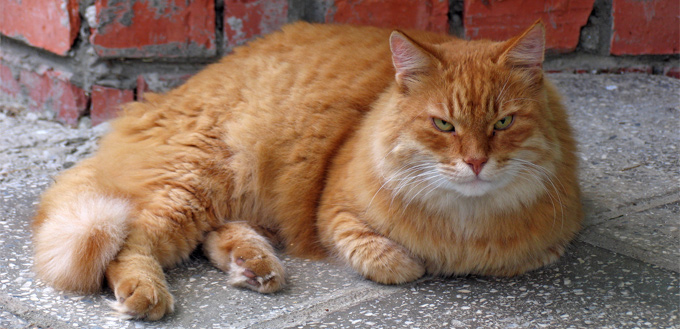
The main problem with Feline Senile Dementia is that many of these symptoms are so common in so many other conditions that also commonly affect older cats. For instance, it is not rare to see cats with osteoarthritis suffer from a handful of the above behavioral changes as a way of coping with their ailment, or the same with diabetes, hyperthyroidism or deafness.
Diagnosing Feline Senile Dementia
Bearing this in mind, if you spot any of these symptoms, it is best to take your cat to the vet so that they can run tests to help ascertain what exactly it is that is affecting your cat, and from there, how best to treat to your cat. It is always the better course of action to take to work alongside your vet when diagnosing illnesses in your cat as, even if your cat displays every single behavior mentioned above, they still could have another, more serious and life-threatening condition.
Your vet will run thorough diagnostic tests to see what exactly is wrong with your cat once they have asked you about your cat’s past health. These tests will include a full physical examination which will help your vet fully determine the overall health of your cat as well as its remaining cognitive functions. In addition to this, your vet will take some blood examples along with conducting an ultrasound if they think it is necessary and even perhaps some X-rays.
In doing so, they will be able to discount or confirm whether your cat’s behavioral changes are in fact the result of Feline Senile Dementia or another disease or illness.
Do Cats Only Howl if They Have Dementia?
While it is true that cats with dementia do start to howl more than a cat without dementia, it is not the only reason that they could exhibit this behavior. Cats can howl for several other reasons. One is through frustration and anxiety, or sometimes it is even a sign of boredom. Cats can be fiercely independent creatures, but they do like to be played with from time to time with their owner. This attention can stop howling in future given that they are tired out from games, but also received the attention they craved.
Additionally, cats which are not spayed can also be prone to howling. During the times they are on heat, they are far more likely to be vocal which can be irritating to owners, who may look at having them spayed if their vocals become far too much. Howling is also a symptom of the aforementioned hyperthyroidism, but it can also be down to a cat having a high blood pressure. Thankfully, both these conditions are easily treated with medication.
All that being said, cats that howl tend to be ones that are starting to age – though that does not immediately mean that the howling is down to a degenerating brain. Cats who are 8 years or older are that much more likely to be suffering from other issues and so howling can also be a sign of them being in pain and suffering. This is why your vet will carry out a full physical examination even if you are convinced that it is simply an issue affecting their brain that is causing their behavior to change. For instance, their vision may be starting to deteriorate which can be extremely stressful for them.
How You Can Help a Cat With Dementia
However, if your cat is finally diagnosed with dementia, what can you do to help them?
Treatment of cats with dementia is difficult, especially as there is sadly no cure. That’s not to say there is nothing owners can do, however. There are plenty of ways that owners can help their cat through what is probably a very anxious and stressful time for them so that their health and wellbeing stays as stable as possible, for as long as possible.
For starters, make sure that you continue to give your cat a lot of physical exercises as well as mental stimulation. By continuing to work both the physical and mental sides of your cat, you will be helping to keep all their muscles strong and organs working at the optimal level. Studies have shown that playing with your cat on a daily basis, when they suffer from feline senile dementia and other cognitive deficiencies, can really help slow down the development of the symptoms.
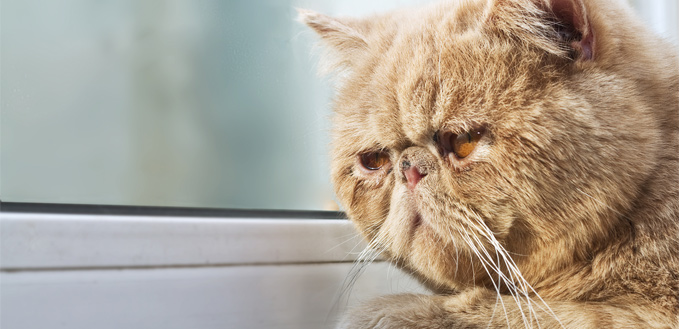
Secondly, try not to change too much, if anything, around the home or in relation to their routine. Cats, in general, do not cope well with changes to their routine, but when they are suffering from dementia, it can be particularly hard on them. Remembering this, try not to change any furniture around in the home and keep their food bowls in the same place, and the same with their litter box. This will help them find their way around the house when their brain is really starting to fail on them. If they become lost or confused, it can be an extremely anxious time for them. Try, as well, to keep them indoors as much as possible if they are outdoor cats so it removes the chances of them becoming lost in their confusion. Remember, as well, to feed them at the same time of day, every day too and try to keep their food the same.
In terms of the wider diet, there are some supplements that can help a cat whose brain is starting to fail them. A diet high in antioxidants can be extremely beneficial as well as one that contains vitamin E and C, alongside Omega-3. Selenium, flavonoids, and carotene are also helpful in addition to carotenoids and carnitine. Given the complex nature of this many vitamins and minerals, work alongside your vet when it comes to a diet that helps impede the cognitive deficiency in your cat.
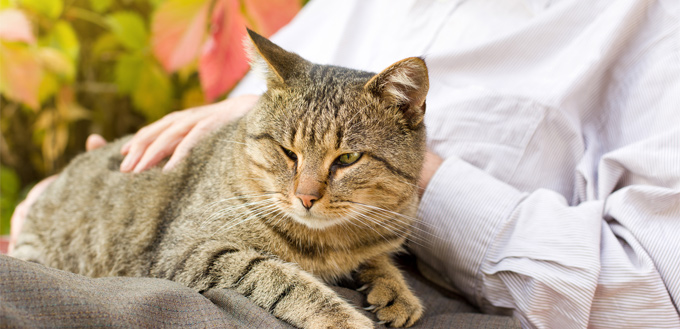
Finally, if your cat suffers particularly badly from anxiety through its aging brain, ask your vet about medication that can be taken to support them through anxiety-inducing situations. There are also a number of ways you can help keep your cat comfortable at night which can help keep their stress levels down. For example, as older cats find it harder to stay warm, look into keeping their bed out of a draughty area and preferably near something warm. If this means moving their bed somewhere very different, which in turn can exacerbate their anxiety, look into adding a cat blanket or even buying a new bed that has warming pads in it that will keep him or her warm throughout the night.
Related Post: Best Heated Cat Beds
If, and when, your cat’s dementia gets really bad and they are starting to forget where their food bowl is and where their litter tray is too often, think about upping the number of them that are dotted around the house. This will help them immensely, and again, keep their anxiety down. When buying new litter trays, look for ones that allow easy access for your cat. This means that they should be wide and shallow so they can step in more easily. Some vets even recommend using sand like litter as this is meant to be kinder on an older cat’s toes.
Having taken all of this on board, and adjusted your cat’s lifestyle where necessary and, importantly, kept it exactly the same in others, remember that your cat will now need regular check-ups with your vet to ensure that there is no other development that your cat is suffering from. Regular check-ups will also allow your vet, as well as you, to monitor how your cat is responding to the treatment you are giving him or her in terms of mental stimulation, diet, and physical exercise. Another advantage of taking your senile cat to the vet regularly is that they are able to keep up with developments in animal medicine so can recommend any new treatments should they ever arise.
Regular check-ups need only be twice a year, but if you see a severe and sudden deterioration in your cat’s health, you will need to take him or her to the vet far sooner.
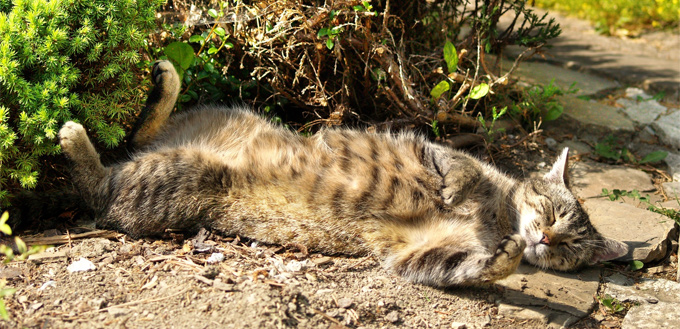
Bottom Line
Cat Dementia is a sad condition that affects many cats – especially now that cats, like humans, are living longer and longer due to improvements in diet and other forms of medicine that keeps them healthier for longer. Given that cat dementia, sufferers are more likely to be cats in old age, it is an increasingly prevalent illness.
It is not a death sentence, however, and owners should be encouraged with how changes in lifestyle and diet can help slow down the development of the disease so that their cat can continue to be happy for as long as possible.
Sources:
- Christine Gustafsson, PhD, MSc, Using a Robotic Cat in Dementia Care: A Pilot Study, Healio
- Dr. Katie Grzyb, DVM, Dementia (Geriatric) in Cats, PetMD
Note: The advice provided in this post is intended for informational purposes and does not constitute medical advice regarding pets. For an accurate diagnosis of your pet's condition, please make an appointment with your vet.





